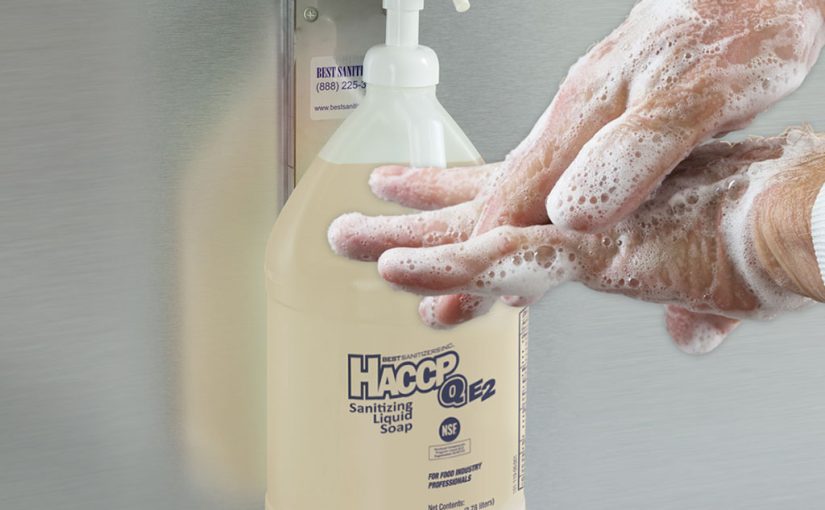Benefits of Choosing Eco-Friendly Hand Soaps
Choosing eco-friendly hand soap is not just a personal preference, but a step towards a sustainable future. Let’s delve into the benefits of making this environmental-friendly choice.
- Healthier Ingredients: Unlike traditional soaps, eco-friendly hand soaps often contain natural ingredients. These are gentle on the skin and free from harsh chemicals that may cause irritation or harm over time.
- Reduced Environmental Footprint: Eco-friendly soaps minimize the environmental impact. They use biodegradable materials that don’t linger in ecosystems. This means less pollution in our waterways and soil.
- Less Plastic Waste: Many eco-friendly hand soap brands prioritize reducing plastic. They offer refills in recyclable packaging, or no packaging at all. This can significantly cut down on plastic waste.
- Supporting Ethical Practices: By choosing sustainable hand soaps, you support companies that are ethical. They often source ingredients responsibly and ensure fair labor practices. This choice can influence the industry to adopt better standards.
- Conservation of Resources: Sustainable hand soaps tend to have a smaller carbon footprint. This is because they use fewer resources in production. Less energy and water usage means conserving these precious resources.
In conclusion, choosing eco-friendly hand soap is beneficial for your health, the environment, and supports ethical practices within the industry. It’s a simple switch that can have a profound impact on our planet.
Key Ingredients to Look for in Sustainable Hand Soaps
When shopping for sustainable hand soaps, knowing the right ingredients can make a big difference. Here is a breakdown of key ingredients to prioritize for eco-friendly hand soap options:
- Aloe Vera: Aloe vera is renowned for its soothing and moisturizing properties. It helps keep the skin hydrated without the harsh effects of chemicals.
- Glycerin: This is a plant-based moisturizer that draws water into the soap, allowing for a gentle cleanse that doesn’t strip the skin of its natural oils.
- Essential oils: Oils such as lavender, tea tree, and peppermint provide natural fragrances without synthetic chemicals. They can also have additional benefits, like antimicrobial properties.
- Shea Butter: Known for its rich, conditioning properties, shea butter adds a creamy texture to hand soaps, making them more nourishing.
- Coconut oil: This oil has natural antibacterial properties, making it an excellent base for hand soaps that clean effectively.
Opting for hand soaps with these ingredients supports sustainable practices and reduces the harmful impacts on the environment. Each ingredient has its unique benefits that contribute not only to effective cleaning but also to a healthier planet.
The Impact of Eco-Friendly Soaps on the Environment
The switch to eco-friendly hand soaps brings significant environmental benefits. These soaps are designed to have minimal impact on our ecosystems. Here are some ways they help preserve our planet:
- Biodegradability: Eco-friendly hand soaps dissolve easily. They don’t harm water life or soil when washed away.
- Reduced Chemical Runoff: They have fewer chemicals. This leads to less toxic runoff into rivers and oceans.
- Sustainable Packaging: Many brands use packaging that’s either recyclable or compostable. This helps reduce landfill waste.
- Lower Carbon Footprint: These soaps often come from local sources. That means less transportation and lower greenhouse gas emissions.
- Conservation of Biodiversity: Natural ingredients avoid the need for pesticides. This protects the habitats and health of wildlife.
- Water Conservation: Producing eco-friendly hand soap generally uses less water. This helps to conserve this precious resource.
Every bottle of eco-friendly hand soap you use means one less bottle of chemical-filled soap that could damage the environment. Small changes in your daily routine can have a ripple effect. They lead to larger, positive changes for the health of our planet.
Top Eco-Friendly Hand Soap Brands for 2024
As we move towards a greener future, various brands have stepped up to offer eco-friendly hand soaps. In 2024, look out for these top brands that not only promise cleanliness but also ensure environmental responsibility.
- EcoSuds: EcoSuds hand soaps use biodegradable formulas and plant-based ingredients, reducing chemical runoff and environmental toxins.
- Green Wash: Known for their zero-waste packaging, Green Wash offers refills in compostable containers and uses essential oils for natural fragrance.
- PureNature: PureNature includes ingredients like organic aloe vera and shea butter, which are gentle on the skin and sourced ethically.
- EarthKind Soaps: EarthKind Soaps focuses on local sourcing to minimize transportation emissions, showcasing their commitment to lower their carbon footprint.
- BioCleanse: Offering a range of soaps including those for sensitive skin, BioCleanse emphasizes water conservation in their production processes.
These brands represent a move towards sustainability while offering effective and gentle cleaning solutions. Choosing any of these brands will help you contribute to a healthier planet in 2024.
DIY Eco-Friendly Hand Soap Recipes
Making your own hand soap can be rewarding. It’s eco-friendly, cost-effective, and creative. Here are some simple recipes to try:
- Aloe Vera & Tea Tree Oil Soap: Combine a cup of liquid castile soap, a quarter cup of aloe vera gel, a teaspoon of glycerin, and ten drops of tea tree oil. Mix well. This blend offers a soothing touch and a clean feel.
- Lavender & Shea Butter Soap: For this, you’ll need half a cup of shea butter, half a cup of coconut oil, and two cups of liquid castile soap. Melt the shea butter and coconut oil together. Let it cool, then stir in the castile soap and add 20 drops of lavender essential oil. It gives a smooth, calming wash.
- Peppermint & Glycerin Soap: Get half a cup of distilled water, half a cup of liquid castile soap, two tablespoons of glycerin, and 15 drops of peppermint oil. Combine all ingredients in a bottle for a refreshing, tingling clean.
- Citrus Bliss Soap: Take the zest of one lemon, one lime, and one orange, mix it with two cups of liquid castile soap, and add 10 drops each of the corresponding essential oils if desired. It leaves hands feeling refreshed and invigorated.
Crafting your hand soap means you control what goes in them. This ensures they’re gentle on your skin and the environment. Always use a clean, recycled soap dispenser to store your DIY soaps. This further reduces plastic waste and aligns with eco-conscious living. Each recipe uses hand soap as a keyword, blending natural ingredients and sustainability.
How to Properly Dispose of Hand Soap Containers
Proper disposal of hand soap containers is crucial in sustainable living. Here are practical steps:
- Check Label Instructions: Look for recycling info on the product label.
- Empty Containers: Rinse them out to remove any soap residue.
- Sort by Material: Separate plastic, metal, or glass components if needed.
- Follow Local Recycling Rules: Use your community’s recycling guidelines.
- Consider Refill Packs: Refill existing dispensers instead of buying new ones.
- Upcycle Containers: Get creative and repurpose them for storage or DIY projects.
Disposing of hand soap containers the right way decreases waste. It sustains our environment by recycling materials and reducing landfill buildup. Always choose recyclable or biodegradable packaging when possible for hand soap. Remember, every small act adds up to a larger impact on our planet’s health.
Certification and Standards for Eco-Friendly Hand Soaps
Choosing eco-friendly hand soaps means looking for certain certifications and standards. These offer assurance that the products meet specific environmental and ethical criteria. Let’s explore some key certifications and what they indicate about the hand soap you choose.
- EcoCert: This certification means the soap contains natural and organic ingredients. It ensures production follows strict ecological standards.
- Fair Trade: Fair Trade certified soaps support better prices and working conditions for farmers and workers.
- Green Seal: Green Seal indicates that the soap meets rigorous performance, health, and environmental criteria.
- Leaping Bunny: This shows the soap is cruelty-free and not tested on animals.
- B Corporation: B Corp certification means the company meets high standards of social and environmental impact.
- USDA Organic: This label shows the soap uses ingredients that are at least 95% organic, avoiding synthetic fertilizers and pesticides.
By looking for these certifications, you can trust that the hand soap you’re using aligns with eco-friendly values. Always check the product labels or company websites for these marks of sustainability. These certifications ensure you are choosing hand soaps that are kind to your skin, the environment, and society. They guide consumers in making informed and ethical choices in their hand hygiene products. As a bonus, supporting products with these standards can drive the industry toward greener practices overall.
The Future of Hand Hygiene: Innovations in Sustainability
The future of hand hygiene is bright with sustainable innovations. Here’s what’s coming:
- Eco-Friendly Formulations: Future hand soaps will use more green chemistry. Companies will create soaps that are even gentler on the environment.
- Smart Dispensers: Expect to see touchless dispensers with refillable options. These use less plastic and can be recharged with eco-friendly soap.
- Water-Saving Products: New hand soaps may need less water to rinse away. This will save water every time you wash your hands.
- Biodegradable Containers: The future will bring more containers that break down naturally. They won’t add to landfill waste.
- Local Sourcing: Brands will source materials closer to production sites. This will reduce the carbon emissions from transportation.
- Technology in Recycling: Advances in tech will make recycling containers even easier. It will help ensure more materials are reused.
These innovations are not only exciting but necessary. They represent the ongoing efforts to reduce our impact on the planet. Hand soap is a daily necessity, and making it sustainable is key for a greener future.



